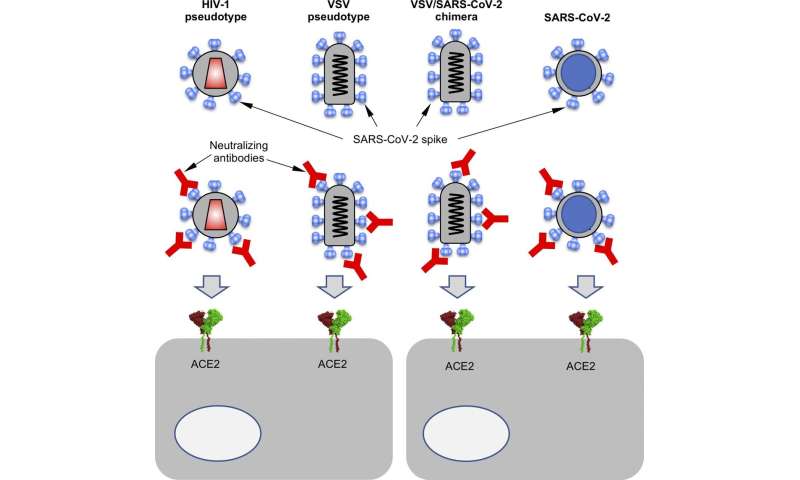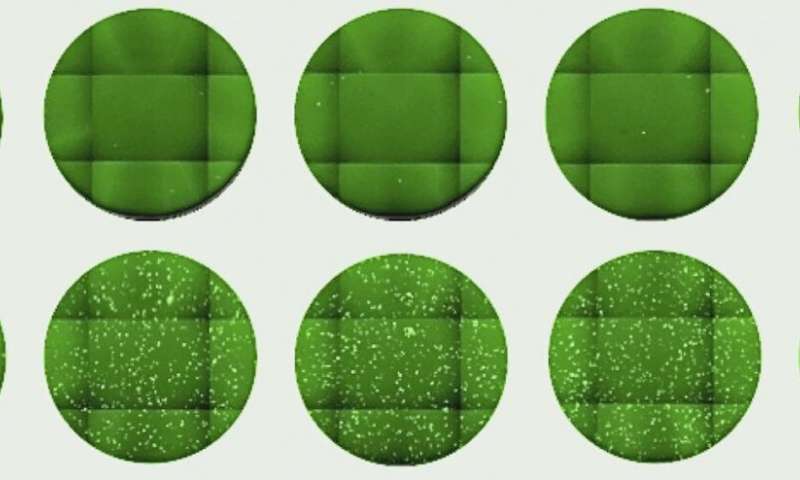
Researchers at The Rockefeller University in New York have developed new tools to rapidly test the ability of antibodies to neutralize SARS-CoV-2, the novel coronavirus responsible for the COVID-19 pandemic. The approach, described today in the Journal of Experimental Medicine (JEM), will help researchers understand whether patients are susceptible to reinfection by SARS-CoV-2 and assess the effectiveness of experimental vaccines, as well as develop antibody-based therapies against the disease.
People infected with SARS-CoV-2 produce neutralizing antibodies that prevent the virus from infecting cells by binding to the spike protein on the virus’s surface. Early studies have suggested that the strength of this antibody response varies greatly between patients, and it remains unknown how long any such neutralizing antibodies persist in the blood to provide protection against reinfection.
Meanwhile, efforts are under way to treat and prevent COVID-19 using either purified antibodies or whole blood plasma collected from convalescent patients who produce large amounts of neutralizing antibodies. Moreover, any successful vaccine against SARS-CoV-2 will have to induce the production of neutralizing antibodies.
“Whether elicited by natural infection or vaccination, or administered as convalescent plasma or in recombinant form, neutralizing antibodies will likely be crucial for curtailing the global burden of COVID-19 disease,” says Paul D. Bieniasz, a professor at The Rockefeller University and investigator at the Howard Hughes Medical Institute. “For this reason, the availability of rapid, convenient, and accurate assays that measure neutralizing antibody activity is crucial for evaluating naturally acquired or artificially induced immunity against SARS-CoV-2.”

Antibody tests using the SARS-CoV-2 virus itself are labor intensive and must be carried out in biosafety level 3 facilities, limiting their widespread application. Bieniasz and colleagues therefore developed a number of safer, surrogate viruses that can be used in place of SARS-CoV-2 to test the neutralizing activity of antibodies targeting the coronavirus spike protein.
The surrogate viruses are versions of either the human immunodeficiency virus type-1 (HIV-1) or vesicular stomatitis virus (VSV) that produce the SARS-CoV-2 spike protein instead of their own surface proteins. Some of these surrogate viruses are unable to replicate, making them even safer to use in the laboratory. Moreover, the viruses are engineered to generate fluorescent or luminescent infected cells, making it easy for researchers to track infection and measure how well this process is blocked by potential neutralizing antibodies.
Bieniasz and colleagues tested the ability of convalescent patient plasma samples and purified antibodies to block the entry of the surrogate viruses into human cells grown in the laboratory. “Each of the surrogate virus-based assays generated quantitative measurements of neutralizing activity that correlated well with neutralization measured using authentic SARS-CoV-2,” says Theodora Hatziioannou, a research associate professor at Rockefeller who co-directed the study with Bieniasz. “In just a few weeks, we have already used these assays to determine the neutralizing potencies of hundreds of plasma samples and monoclonal antibodies in a biosafety level 2 laboratory.”
Source: Read Full Article
